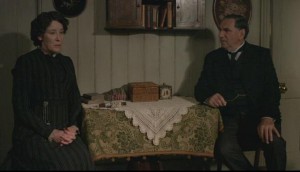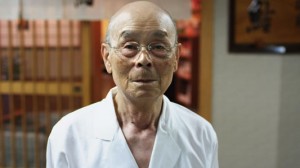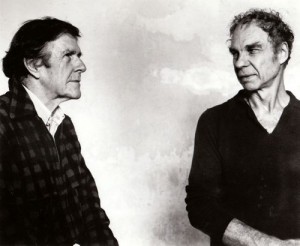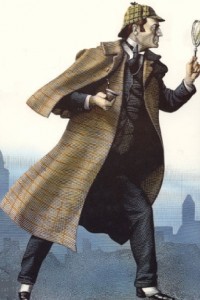Today, besides being the day that the third season of Downton Abbey airs here in the U.S., is also the Feast of the Epiphany, a.k.a. Three Kings Day, or (most memorable to me) my due date last year. It has been quite a year! Actually, Downton Abbey has a special place in my heart because of the important role it played in my life last January and February – namely, it is what got me through those long hours in the middle of the night nursing Andreas during his first several weeks. I will be forever grateful for this beautiful and riveting show.
 I’ve been gearing up for the airing of the third season by re-watching the previous seasons (this time after Andreas goes to bed – for the entire night!). During one episode in the first season I was struck by something Mr. Carson said to Mrs. Hughes as she contemplated her own path and how she had changed. He said, “life’s altered you, as it’s altered me. What would be the point of living if we didn’t let life change us?”
I’ve been gearing up for the airing of the third season by re-watching the previous seasons (this time after Andreas goes to bed – for the entire night!). During one episode in the first season I was struck by something Mr. Carson said to Mrs. Hughes as she contemplated her own path and how she had changed. He said, “life’s altered you, as it’s altered me. What would be the point of living if we didn’t let life change us?”
Earlier in the episode Lord Grantham and Matthew Crawley were talking together as they walked the grounds and surveyed work being done. Lord Grantham asks Matthew if he had begun to see a future for himself at Downton saying, “there are absurdities involved as I know well enough.” Matthew responds, “- but possibilities too and I was blind to them. I was determined not to let it change me. That was absurd. If you don’t change, you die.”
These were, of course, especially poignant conversations as Downton Abbey (along with the rest of the world) would soon be changed forever with the first world war and social upheaval was on the horizon.
Change has obviously been on my mind – all kinds of change. The way society changes, the way people change, and the way people respond to change they didn’t want. My thoughts have been prompted in part by recent events that have inflamed the nation and, therefore, Facebook. My news feed wall exposed the seemingly irreconcilable divide among the wide array of friends and acquaintances that I have gathered at various points throughout my life. Seeing the huge spectrum of opinions got me wondering once again how tastes, attitudes and even world-views evolve over the course of a lifetime. And it laid bare the huge shifts that have taken place in my own life. My experiences, good and bad, combined with the stories of all kinds of people and all kinds of places have percolated inside me. I have changed. How could I not be changed?
I used to have this underlying fear that I was just easily influenced, blown this way and that by the prevailing winds. Though that may have been true at certain moments in time, in the grand scheme of things, I no longer believe that to be the case. Over time, skepticism has replaced the envy I had of those who seemed to know where they stood at all times. I have become more comfortable with not having all the answers – and with changing my mind.
Why am I baring my wishy-washy soul to you right now? I suppose it’s to sing the praises of change. Some kind of change. It doesn’t have to be big or philosophical or life-altering, though it very well might be. I don’t really make New Year’s resolutions, but if I did, one of my resolutions this year might be to throw a little wrench in the works when things get too ingrained, automatic, or stale.
In fact, I have a delightful wrench-in-the-works coming very soon. A new horn is on its way – a very different kind of horn from anything I’ve ever played. Operating in default mode is an easy thing to do at a certain point, and pretty soon, the ears and mind can turn off. I wouldn’t mind catching that before it goes too far. That is not the only reason (or even the main reason) I’m going to be experimenting with new equipment, but I can hope that it will be a good by-product of trying something new, re-energizing my ears and possibly re-wiring a few hardened neural pathways.
What about the question of staying true to oneself? I don’t believe being true to yourself means never changing. I believe it is more genuine to pause to listen and ask questions when something feels not quite right and being willing to consider a different way.
To finish the earlier conversation between Lord Grantham and Matthew Crawley, after Matthew shared his willingness to be changed by his new circumstances, Lord Grantham responded, “I don’t know. Sometimes I think I hate change.” and Matthew, looking at a structure on the estate being spruced up said, “well, at least we can comfort ourselves that this will still be here – because we saved it.”
May the willingness to see things anew allow us to save the things most important to us this year. Happy Feast of the Epiphany!

 I hear that many residents in Newtown, Connecticut are taking their Christmas decorations down, and I have to admit that I haven’t been feeling much like celebrating either the last few days. In the rest of the country, though we are grieving and in disbelief, holiday festivities are happening as planned, and and I played a Christmas concert yesterday afternoon accompanying the Mendelssohn Club, a choir based here in Philadelphia. The yearly concert takes place in the beautiful St. Paul’s Episcopal Church in Chestnut Hill. The church is always filled for the occasion and this year was no exception.
I hear that many residents in Newtown, Connecticut are taking their Christmas decorations down, and I have to admit that I haven’t been feeling much like celebrating either the last few days. In the rest of the country, though we are grieving and in disbelief, holiday festivities are happening as planned, and and I played a Christmas concert yesterday afternoon accompanying the Mendelssohn Club, a choir based here in Philadelphia. The yearly concert takes place in the beautiful St. Paul’s Episcopal Church in Chestnut Hill. The church is always filled for the occasion and this year was no exception. I watched Jiro Dreams of Sushi a few nights ago.
I watched Jiro Dreams of Sushi a few nights ago. Then I had a chance to visit one of my favorite libraries ever when Dave, Andreas and I were in New York a couple weeks ago. A friend had recently reminded me of the
Then I had a chance to visit one of my favorite libraries ever when Dave, Andreas and I were in New York a couple weeks ago. A friend had recently reminded me of the 

